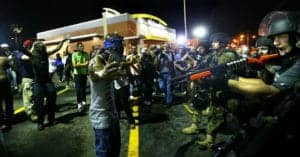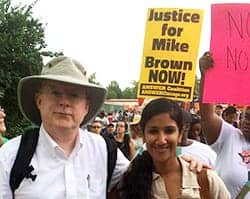by Bill Quigley

When the Michael Brown verdict is announced, people can expect the police to take at least 10 different illegal actions to prevent people from exercising their constitutional rights. The Ferguson police have been on TV more than others, so people can see how awful they have been acting. But their illegal police tactics are unfortunately quite commonly used by other law enforcement in big protests across the U.S.
The First Amendment to the U.S. Constitution promises the government will not abridge freedom of speech or prevent the right of the people to peaceably assemble or to petition the government for the redress of grievances.
Here is what they may do; watch for each of these illegal actions when the crowds start to grow.
- Try to stop people from protesting. The police all say they know they have to let people protest. So they usually will allow protests for a while. Then the police will get tired and impatient and try to stop people from continuing to protest. The government will say people can only protest until a certain time, or on a certain street, or only if they keep moving, or not there, not here, not now, no longer. Such police action is not authorized by the U.S. Constitution. People have a right to protest, the government should leave them alone.
- Provocateurs. Police have likely already planted dozens of officers, black and white, male and female, inside the various protest groups. These officers will illegally spy on peaceful protesters and at times can take illegal actions themselves and encourage other people to take illegal action. They will even be arrested with others but magically not end up in jail. Others inside the groups will be paid to inform on the group to the government. Comically, when undercover police are uncovered, they often claim they have a constitutional right to be there and try to use the Constitution they are violating as a shield!
- Snatch squads. Police will decide who they do not like or who they think are leaders. Then they will use small heavily armed groups to knife into peaceful crowds and grab people, pull them out and arrest them.
- False arrests. The police will arrest whoever they choose whenever they choose and will make up stories to justify the arrests. If people are breaking glass or hurting others, those arrests are legal. However, the police will arrest first and sort out who they arrested later. Police in Ferguson have already wrongfully arrested legal observers, a law professor and church leaders.
- Intimidation. As they have shown many times in Ferguson and all over the country, once the protests heat up, police will show up in full riot gear, dressed like ninja turtles – big flashy guns, plastic shields, big batons, shin guards, gas masks, flex cuffs – and act like they are military warriors protecting people from ISIS invasion.
- Kettling or encircling. The police will surround a group and pen them in and not let them move. They will either arrest all or force them to leave in one direction. This, as the police know fully well, always sweeps up innocent bystanders as well as protestors. NYPD did this with hundreds on the Brooklyn Bridge and at many other protests. Sometimes they deploy orange plastic nets or snow fencing, sometimes just lots of police.
- Raids on supportive churches, organizations or homes. Often the police make illegal pre-emptive raids on places where volunteers are sleeping, cooking or parking their cars. They lie to locals and accuse the protesters of links to violent organizations.
- Pain noise trucks. Police will also use LRAD noise trucks (Long Range Acoustic Device). First used in Iraq, they are now used against peaceful protesters in the U.S. The trucks blast bursts of sound powerful enough to cause pain. Never approved by any court, this intentional infliction of pain is another sign of the militarization of the police. Police also use MRAPs (Mine Resistant Ambush Protected Vehicles), heavily armored trucks which look like tanks but roll on wheels, not treads. This is part of the intimidation.
- Arrest reporters. When the police are feeling the heat of public view, they will force journalists away from the protesters. Those who insist on engaging in constitutionally protected activity and returning to the scene will be arrested.
- Chemical and other weapons. When the police get really desperate and afraid, they will try to disperse the entire crowd with pepper spray, tear gas and other chemical weapons, rubber or wooden bullets. If this happens, the police have just about lost control and are at their most dangerous.

Dozens and dozens of different police forces will be surrounding the protesters in Ferguson when the Michael Brown verdict is announced. There will be federal FBI agents, Homeland Security, U.S. Marshalls, State Police troopers, county sheriffs and local city cops from the dozens of little towns in and around St. Louis.
Perhaps this will be the time when the peoples’ constitutional rights to protest are actually protected. We can only hope. But in the meantime, look for these common police tactics.
Bill Quigley is a law professor at Loyola University New Orleans and associate legal director for the Center for Constitutional Rights. Email him at Quigley@loyno.edu. This story originally appeared on the Huffington Post.





